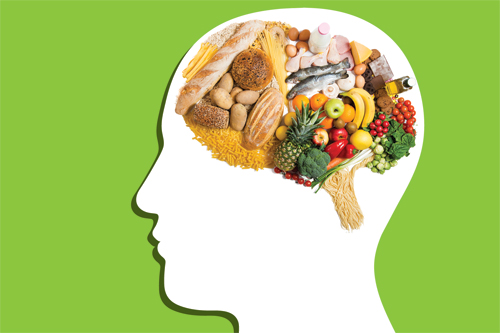Are your habits hijacking your brain’s functionality? While sleep deprivation and other exhausters have an impact on brain efficacy, eating habits have the largest effect on how you boost or deplete your brain activity. With a well-chosen plan to ingest, manage, and maintain the #1 brain fuel, you can enhance how well you remember, learn, concentrate, and behave.
According to research provided by The Franklin Institute Resources for Science Learning website, glucose (also known as sugar) is your brain’s sole fuel source. Directly obtained from the food you eat (such as grains, legumes, fruits, vegetables, dairy products), glucose breaks down from carbohydrates into sugar in your stomach and then is absorbed into your bloodstream. Once in the brain, glucose energizes mitochondria (the organelle in each cell responsible for respiration and energy production) to convert chemical energy into a compound that can be used for cell energy.
Neurons, the primary information conductors in your brain, cannot store glucose; they depend on a constant supply delivered by the bloodstream. Always in a state of metabolic activity (even while you sleep), neurons have a constant need for energy so that they can manufacture enzymes and neurotransmitters, plus process bioelectric signals that communicate throughout your nervous system—a mechanism that consumes one-half of your brain’s energy (and almost 10% of your body’s total energy).
While brain cells require twice the amount of energy of cells throughout the rest of your body, glucose rapidly depletes during mental activity. In fact, recent studies prove that mental concentration significantly depletes glucose in areas related to memory and learning, specifically in the hippocampus. Understanding how your brain uses energy might put you on track to be very aware of your habits and to fuel your brain with enough glucose for it to succeed.
Some tips to consider:
A quick fix of sugar (like a sugary snack or soft drink) is the wrong way to go. Your blood sugar level will spike, which causes your pancreas to secrete insulin, triggering cells throughout your body to extract excess glucose from your bloodstream and store it for future use. When this happens, the glucose available to your brain drops, neurons experience an energy crisis, and you feel foggy, spacey, weak, and confused. Technically this state is called hypoglycemia. While in it, you will find it incredibly tough to concentrate, think, or act.
Minimize blood sugar swings by ingesting complex carbohydrates. Available in natural foods such as slow-cooked oatmeal, beans, lentils, sweet potatoes, brown rice, and rye, complex carbohydrates contain long chains of sugar molecules that your liver slowly breaks down to short glucose molecules accessible as energy in your brain. The cell walls in natural food resist the process of digestion, so sugar is broken down and released into the bloodstream at a much slower pace. These types of foods become great sources of brain fuel as they minimize blood sugar swings, stabilize energy delivery, and optimize mental processes.
Eat in threes. This simple plan, suggested by nutritionist Mark McDonald and Dr. Mehmet Oz, offers a terrific strategy that takes the guesswork out of fueling your brain in two easy steps: (1) Eat every three hours to support your body’s natural feeding rhythm, (2) Compose meals of one-third protein, one-third healthy fats, one-third complex carbohydrates.
Make good food choices. Consume glucose-balancing foods in each of the three major categories:
Protein: cheese, chicken, eggs, fish and shellfish, Greek yogurt, quinoa, 1% organic milk
Fiber: almonds, apples, baby carrots, barley, cantaloupe, flaxseed, strawberries, sweet potatoes, watermelon, lentils, oatmeal, oranges, pears
Fats: avocado, pistachios, peanut butter, walnuts.
Note: Blood sugar levels primarily link to the type and amount of food you consume, plus how your body creates and uses insulin (the hormone that transports sugar to your cells). Like everything in your body, glucose levels need to be balanced: While too little glucose can cause brain fatigue, over a period of years too much glucose can result in hyperglycemia and/or diabetes.
In our on-the-go lifestyle, it has become normal to sacrifice healthy, dependable eating habits for efficient scheduling and productivity. With a little attention, however, it’s easy to supply your brain with the constant energy it needs so that you can feel more calm, organized, and focused throughout the day.



